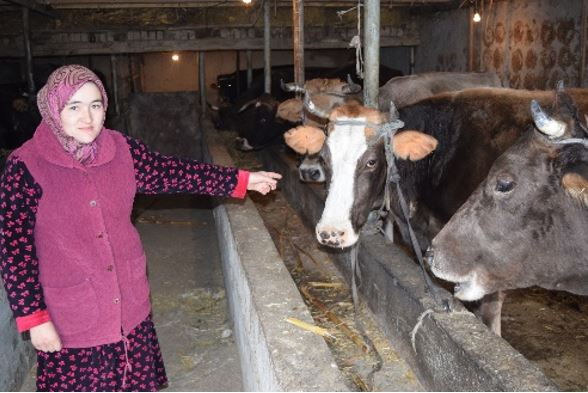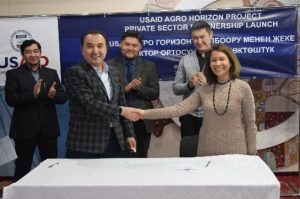
Rislikhan Saidkosimova, a dairy farmer in Gairat village, with her family’s cows
Following tradition in Kyrgyzstan, Rislikhan Saidkosimova, a 23-year-old mother of two, took on many household chores, including milking her family’s 10 cows, when she married her husband and moved into her in-laws’ home. A proud smile appears on Rislikhan’s face when her mother-in-law refers to her as her right hand. But Rislikhan’s role offers more than just personal accomplishment. When half of the family’s cows received high-quality feed from the USAID Agro Horizon project, they started bringing in an additional KGS 12,000, or US$150, a month.
The project, implemented by ACDI/VOCA, partnered with the Training and Extension System (TES) Center to help farmers like Rislikhan increase milk production during the winter. Rislikhan’s family was one of 150 households to learn best practices for producing high-quality milk in the off-season when demand is high.
“I feel like the dairy farmers participating in this program have unlocked the secret of winter milk production, which is a balanced, quality feed. We are now more competitive and have higher profits.” – Rislikhan Saidkosimova, a dairy farmer and Agro Horizon participant
Farmers who took part in the project signed a six-month contract with Osh Sut, a milk processor previously burdened by an unreliable supply of low-quality milk. Under the contract, farmers sell up to 1,000 liters of milk a day at set prices, which allows Osh Sut to ramp up production and farmers to benefit financially. In two years, Agro Horizon aims to increase milk production for 300 farmers by 60 percent during winter months. Rislikhan dreams this will one day lead to owning a separate home for her young family of four.

In the Alayku Valley, known for its harsh climate 3,000 meters above sea level, winter is especially unforgiving. Askar Mametjanov, who grew up there, now serves as director of Alaiku Organics, a leading producer of qurut, the country’s popular yogurt drink. His company partnered with Agro Horizon to set up collection stations and a processing center in the larger village of Kyzyl-Jar. Farmers received high-quality feed so they could deliver a year-round supply of milk to Alaiku Organics for value-added processing. This not only increased their incomes, but also improved the company’s commercial sustainability thanks to a stable supply chain.
“We have a saying: if you want to walk faster, walk alone; if you want to walk longer, walk together. We choose to walk longer in partnership with the USAID Agro Horizon project. Together we can create economic opportunities, especially during the winter, for high altitude Alayku Valley inhabitants [who] currently live at a subsistence level.” – Askar Mametjanov, director of Alaiku Organics
Agro Horizon’s 18 private-sector partnerships aim to grow the country’s agricultural sector, particularly in the less-developed southern region. An anticipated 20 more partnerships will continue those efforts to support milk production by offering new equipment, facilitating value chain financing, and more.
The project, which targets the Osh, Jalal-Abad, Batken, and Naryn regions, is one of many economic growth initiatives funded by USAID to boost employment and strengthen business opportunities in Kyrgyzstan.








